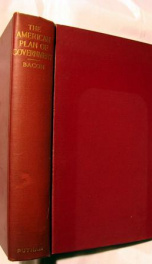the american plan of government

Purchase of this book includes free trial access to www.million-books.com where you can read more than a million books for free. This is an OCR edition with typos. Excerpt from book: CHAPTER III THE PEOPLE OF THE UNITED STATES The opening paragraph of the Constitution is usually called the Preamble, which means preface or introduction, because it states the purposes for which our government was established. It does not give the national government any rights or powers at all. The Supreme Court so ruled in the case of Jacobson vs. Massachusetts,1 in which the point was made that a State law compelling people to be vaccinated as a preventive treatment against smallpox was unconstitutional because it tended to subvert and defeat a purpose of the Constitution of the United States. Justice Harlan said: Although that Preamble [of the Constitution of the United States] indicates the general purposes for which the people ordained and established the Constitution, it has never been regarded as the source of any substantive power conferred on the Government of the United States or on any of its Departments. Such powers embrace only those expressly granted in the body of the Constitution and such as may be implied from those so granted. Although, therefore, one of the declared objects of the Constitution was to secure the blessings of liberty to all under the sovereign jurisdiction and authority of the United States, no power can be exerted to that end by '197U.S. Rep., ii. the United States, unless, apart from the Preamble, it be found in some express delegation of power or in some power to be properly implied therefrom. We, the People of the United States, in Order to form a more perfect Union, establish Justice, insure domestic Tranquility, provide for the common defence, promote the general Welfare, and secure the Blessings of Liberty to ourselves and our Posterity, do ordain and establish this Constitution for the United States of America. We, t...
Info about the book
Author:
Series:
Unknown
ISBN:
1400200962
Rating:
2.5/5 (2)Your rating:
0/5
Languge:
English
Users who have this book
Users who want this book
What readers are saying
What do you think? Write your own comment on this book!
write a commentGenre
if you like the american plan of government try:
Other books by this author
Do you want to read a book that interests you? It’s EASY!
Create an account and send a request for reading to other users on the Webpage of the book!

